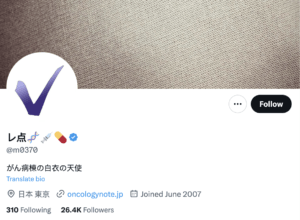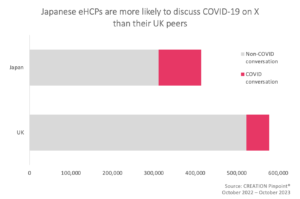While it is well established that healthcare professionals (HCPs) around the world use social media to connect with one another, advocate for patients and share clinical trial data, there are often stark differences between countries in the way HCPs behave and interact with each other online. This is especially true for Japan, where the online behaviour of HCPs often differs markedly from their peers in the US, the UK and so on. The reasons for these differences are often complex and rooted in a country’s culture, but understanding them are key to successfully leveraging insights from listening to the unprompted online conversation of HCPs.
Using CREATION Pinpoint® we analysed the conversations of 3,324 HCPs in Japan discussing patients and treatments. They posted over 410,000 times on X (formerly Twitter) during the period between October 2022 and October 2023. Our analysis shows how Japanese HCPs exhibit unique behaviours online and interact on different platforms compared with peers in other markets.
Japanese HCPs tend to value anonymity in their online profiles
When looking at the profile of a typical HCP based in the United States or a European country, it is common for their profile picture to be a high-resolution headshot, often taken by their institution. This is not the case for Japanese healthcare professionals; many HCPs in Japan eschew using their face in their profile picture in favour of a picture of a cartoon character, a pet or similar.

Of the 100 most active HCPs identified in this study, 70 of them did not have a picture of themselves on their profile. For many, they also did not use their real name on their profile, instead opting to use a pseudonym. CREATION.co uses manual analysis of their social media profiles, including descriptions and location, to verify that they are HCPs.
This anonymity is no barrier to relevance within the online HCP conversation however. Collectively, the 70 most active HCPs in Japan who opted to have an anonymous or semi-anonymous account collectively had 24,044 verified HCP global followers. Their posts were shared more than 9,000 times by other HCPs within the study period. This goes to show that being able to immediately identify an eHCP, to consider their views and needs, is less important within the Japanese context than it is in other online conversations in different countries.
COVID-19 and vaccine conversation remained a high priority for Japanese HCPs
Throughout the period October 2022 to October 2023, the COVID-19 conversation amongst Japanese HCPs remained high throughout the year, reaching a peak of 3,434 mentions on November 21 as HCPs reacted to the news of an “eighth wave”(第8波) of Coronavirus infections.
新型コロナ「第8波」の北海道 感染者急増で診療所”ひっ迫” 医療スタッフと薬不足が深刻 (HBCニュース)#Yahooニュースhttps://t.co/hJFQCOvZ0D
— レイ (@3104rei228) November 21, 2022
The level of conversation around COVID-19 remained high throughout the year, with an average of 1,934 weekly posts from Japanese HCPs. This is in sharp contrast to the behaviour of HCPs in the UK, who spoke far less about COVID-19 online throughout the same period. Despite generating 163,627 more posts than their Japanese counterparts overall, UK HCPs made on average 900 less COVID-19 posts per week.

Japanese societal attitudes towards vaccination, and a history of vaccine hesitancy may explain why Japanese HCPs speak frequently about vaccine uptake. This trend of Japanese HCPs speaking about vaccine uptake and education can be seen in the Human Papillomavirus (HPV) conversation, where some HCPs identified in this study sought to inform and support peers. Patients too are told to “make to make sure you do” (するようにしましょう), for example when HCPs talk about paediatric vaccinations.
副反応が心配で、予防接種に対して消極的な保護者もいます
現在、日本で使用されている小児へのワクチンは、副反応の頻度も少ないと考えられています
重篤な感染症からお子さんを守るためにも必要なワクチンですので、確実に接種するようにしましょう
ご不安な点があれば、かかりつけ医でご相談を
— Dr. KID (@Dr_KID_) September 26, 2023
Healthcare professionals in Japan interact in a wide and unique range of online spaces
As our analysis has shown, healthcare professionals in Japan are highly active on X. However, this is by no means the only online space Japanese HCPs use to interact with one another. For example, a popular platform to ask questions directly to Japanese HCPs is marshmallow-qa.com (マシュマロ). While HCPs in other countries frequently host ‘Q and A’ threads on public social media, where fellow HCPs and patients can publicly ask questions of one another, cultural norms mean this is less common within the Japanese online HCP conversation. Instead, HCPs direct questions to “Marshmallow or DM”; sites like Marshmallow allow users to anonymously, privately ask questions to HCPs. Other sites, such as Peing.net, perform a similar function of allowing HCPs to privately put questions to their peers.
「これってどうなんだろう…?」
「薬局で聞きそびれちゃった…」Twitterには簡単に
詳細は、ブログでまとめるようにしていますご質問などは、マシュマロやDM????https://t.co/gnbKdSBXkX
ブログはこちら????♀️https://t.co/APNxyyJtCb
— 薬剤師T|調剤薬局の相談屋 (@pharmacistT89) August 4, 2023
Another interesting behaviour of Japanese HCPs, less prevalent in other markets, is the use of personal blogs. This is reflected in the profiles of Japanese HCPs. A number of prominent HCPs in Japan include a link to their blog, with Ameblo.jp being a popular platform for longer articles.
ミラドライ治療後レポート329
⇒ https://t.co/6dI7NP6Vzu #アメブロ @ameba_officialより— ぺルラクリニック神宮前 本田淳 (@JunHonda_Perla) September 9, 2023
Similarly, some Japanese HCPs will include links to the website of their clinic or practice. Due to the national insurance nature of the Japanese healthcare system, in which patients can choose to receive treatment at a clinic of their choice, Japanese HCPs commonly post links to their practice; a trend less pronounced in other markets, especially in countries like the UK which have a universal or single-payer healthcare system.
Understanding HCP digital behaviours should inform engagement
By analysing the unprompted online conversations of HCPs in Japan, it is clear that they exhibit unique online behaviours when compared to peers in other countries. For the pharma industry, understanding and adapting to these behaviours is key to effective engagement. For example in Japan, giving space for HCPs to communicate with peers and engage anonymously could be an effective way to understand and meet their information needs.
If you want to connect with your healthcare professional stakeholders in a meaningful way then we’d love to share more examples with you and help you take your first steps. Get in touch for a free short consultation.
 By Cameron Bassindale
By Cameron Bassindale 
